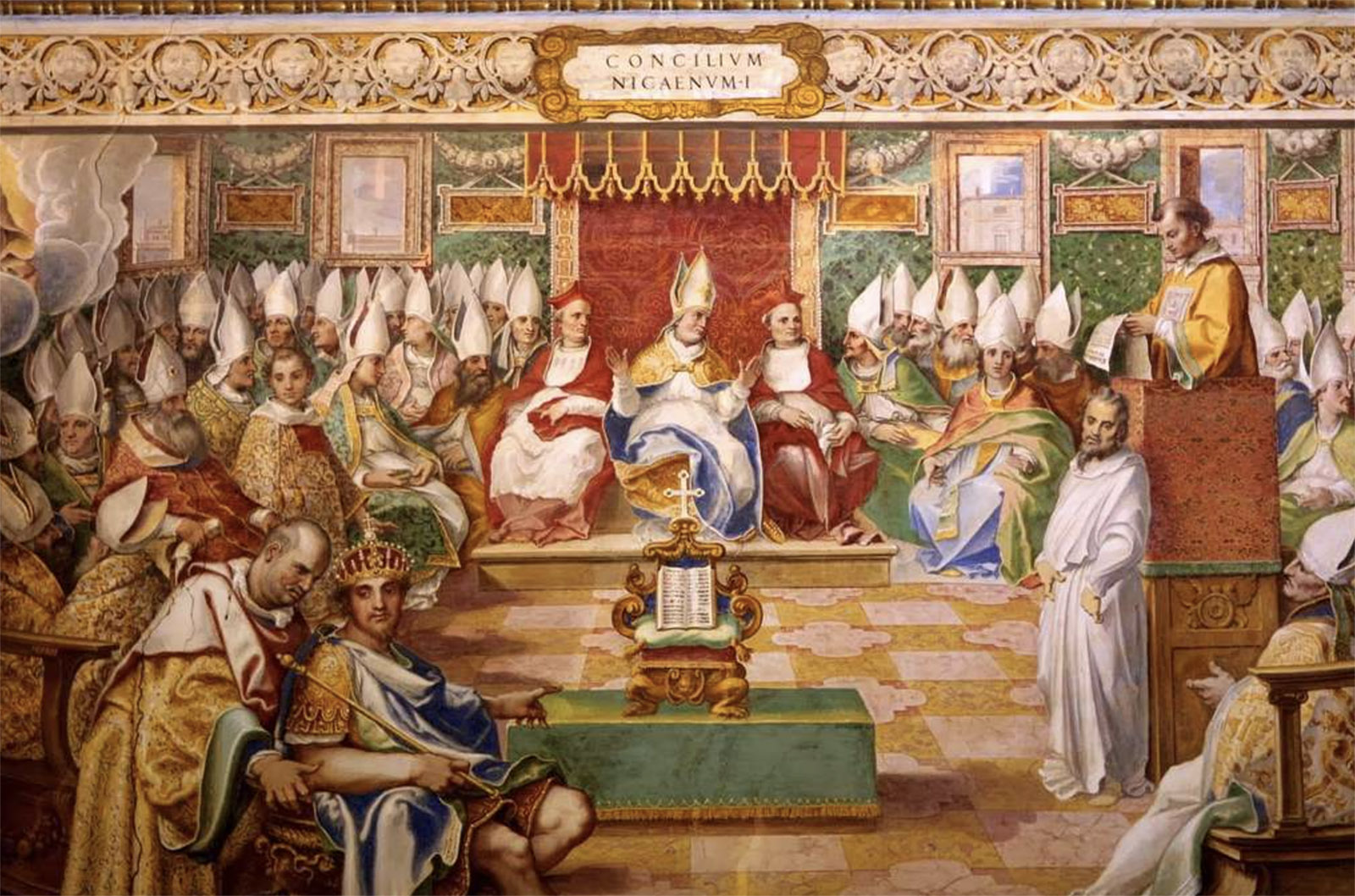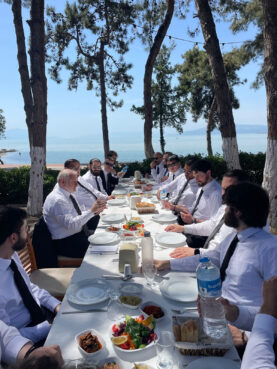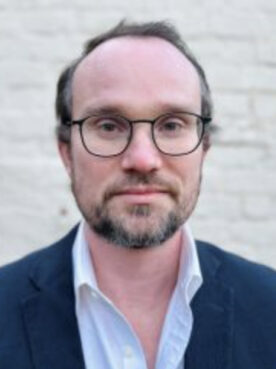
İZNIK, Turkey (RNS) — For Christian leaders across the world and across denominations, the anniversary of the first Council of Nicaea is providing an opportunity for introspection and, potentially, the beginning of further dialogue.
Seventeen hundred years ago — from May through July 325 — more than 200 bishops of early Christian churches gathered in the town of Nicaea, then in the Roman province of Bithynia (now İznik, Turkey), to determine a unified theology. Among the matters they agreed upon were the date of Easter and Jesus’ place within the Trinity.
It was all codified in the Nicene Creed, which held that Jesus was “God from God, light from light, true God from true God, begotten not made, of one substance with the Father.” The last clause was a matter of debate in the fourth century, with factions known as Arians contending that God the son and God the father were not equal and co-eternal entities.
Nearly two millennia later, Arianism is in the distant past, the remains of the basilica where the hierarchs met is submerged beneath the shores of a Turkish lake and the Nicene Creed is considered by many to be the basic premise that defines a group as Christian.

Seminarians from Hellenic College and Holy Cross Greek Orthodox School of Theology have lunch with Archbishop Elpidophoros of America, left, on the shores of Lake İznik, Turkey, May 23, 2025. (Photo by David I. Klein)
Christian leaders across continents and denominations stress that the council still has relevance today, namely its ecumenical nature, or that the council represented a united and universal church despite theological divides.
“The consequence is that this anniversary has to also mean something for today,” Greek Orthodox Archbishop Elpidophoros of America told RNS on Friday (May 23) in İznik while leading a group of American pilgrims and Orthodox seminarians.
The anniversary of the council has recently been considered a symbol for what ecumenical dialogue could look like between Eastern and Western churches. “We see today that we really lost what we had 1,700 years ago,” Elpidophoros said.
Pope Francis and Ecumenical Patriarch Bartholomew I, the spiritual leader of the world’s Eastern Orthodox Christians, raised the idea of hosting a joint meeting in Nicaea when the two met in Jerusalem in 2014. Francis last year reiterated his interest in gathering in Nicaea for the anniversary, but his illness and death scuttled any plans. Pope Leo XIV has also expressed interest in the idea, but such a meeting is not publicly set.
Just as the calculation of Easter’s date was a main topic at the original council, reestablishing a joint celebration of Easter among Eastern and Western churches is something many hope the leaders would discuss at such a meeting. Christians celebrated Easter on the same date this year due to their respective calendars lining up, but the calculations used by Catholic and Protestant churches and those used by Orthodox churches can place their Easters as much as five weeks apart.
“It seems that there is a political will — an ecclesiastical will, if you might put it in the religious language,” Elpidophoros said. “The late pope was ready to really do something about this, but God had other plans for him. But it seems that his successor, Pope Leo XIV, is on the same line, and this was clear at his meeting with the ecumenical patriarch. This gives us all hope that our leaders, the heads of our churches, really understand the signs of the times.”

Samuel Noble. (Photo courtesy of Aga Khan University)
Nonetheless, a change to the date of Easter is no small task, especially for the Orthodox side, said Samuel Noble, a scholar of Orthodox Christianity at Aga Khan University in London.
“It was conceivable to a lot of people, given Pope Francis’ personality and his tendency to do big gestures,” Noble said. However, unlike the Catholic Church, the Eastern Orthodox churches are a collection of more than a dozen independent churches. “On the Orthodox side, it would be almost impossible … without a major council to make a decision.”
And notably, Bartholomew’s recent major moves have been tenuously received in the wider Orthodox community — for example, when he acknowledged the independence of the Orthodox Church of Ukraine, resulting in a schism with the Russian Orthodox Church, the world’s largest Orthodox body. And his attempt to convene a pan-Orthodox council in Crete in 2016 was snubbed by the Russian, Bulgarian, Georgian and Antiochian Orthodox churches.
“There’s just a lot of apprehension in the Orthodox world about anybody doing anything unilaterally at a time when there’s already so much division, and so many people are walking on eggshells in their relationships between the various churches,” Noble said.
From the Catholic side, while the pope does have such authority, it would be an enormous proposition for Leo to take on so early in his papacy.
Although the pope and patriarch have not yet gathered in Nicaea, the town has seen a steady stream of Christian leaders making a pilgrimage. For example, Elpidophoros’ group visited with a joint delegation of Finnish Christian leaders, including both its Orthodox archbishop and Catholic bishop of Helsinki.
“In Finland, you have to be ecumenical in any church,” said the Rev. Heikki Huttunen, a Finnish Orthodox priest on the trip who previously served as secretary general of the Ecumenical Council of Finland.
Huttunen said another noteworthy aspect of the Council of Nicaea was that it occurred only 12 years after Christianity was legalized in the Roman Empire.
“The church who got together in Nicaea was a church which came out of persecutions, so it was like the opposite of the established churches of today,” Huttunen said. “It was persecuted. It was its people. Its leaders were mutilated, and many had died. Those who met in Nicaea were survivors of the persecutions, so they came out of a position of no power at all.”
He said Christians today can take note from that, as the religion should give a voice to those who don’t have one, specifically the poor, animals and the natural environment. Huttunen stressed his desire for the church to address social and ecological issues, and he noted how early church fathers were able to draw on Hellenistic philosophy and their wider world outside of the Bible to address theological concerns.
“That was courageous and that was creative and that was new,” he said.
Like Huttunen, the Rev. Bartholomew Mercado, a professor at the Holy Cross Greek Orthodox School of Theology in Brookline, Massachusetts, said that being in historic Nicaea, he felt the weight of its history on his shoulders.
“You have this sense that we’re part of this living tradition,” he said on the shores of Lake İznik, where the ruins of the Nicaea basilica remain beneath the waves. “We’re a part of this continued faith. And to be successors of this, there’s a lot that we have to consider because it’s not just about continuing in faith tradition — it’s also about continuing in that mentality. And that mentality was never rigid. We have to think about where we stand in such a privileged position, and how we have a responsibility in that position to look after those who are not in such a privileged position — other people who are being persecuted and not only our own because to look after one’s own is way too easy.”
